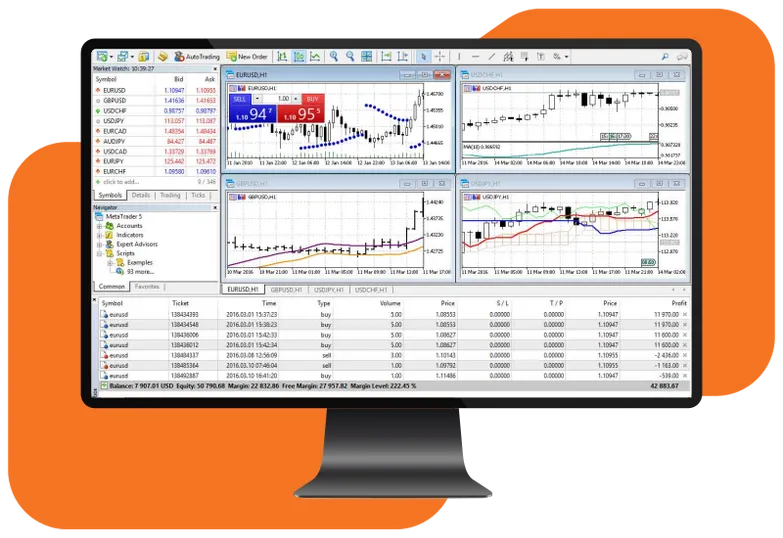Index Trading
Indices monitor how stocks in a specific sector or market perform. Trade on the world's most influential indices, such as the S&P 500 and the Dow Jones Industrial Average, to gain a well-rounded exposure to the markets they represent.
Start Trading
Why trade Indices with TradeSmart?

Global Indices

Commission Fees

Industry Leading Spreads

Dedicated Support

What is
Index Trading?
Trading indices involves buying and selling financial instruments that reflect the performance of a group of stocks or other assets, rather than individual securities.
An index serves as a gauge of a specific market’s performance, and trading indices entails making trades based on the market’s direction by buying or selling derivatives linked to the index. For instance, the S&P 500 index monitors the performance of the top 500 publicly traded companies in the United States.
Traders can engage in indices trading by trading futures contracts linked to indices, such as the S&P 500, speculating on whether the overall value of those companies will rise or fall.
Various financial instruments, including contracts for difference (CFDs), facilitate indices trading. At TradeSmart, you can participate in CFD trading on major indices like UK 100 and GER 40, benefiting from ultra-fast execution.
One Platform.
Limitless Capabilities.
Metatrader 5
Take the maximum advantage of any market situation with the advanced MT5 platform.
FAQs
What moves the price of an Index?
The price of an index is influenced by a multitude of factors, including:
Company Performance:The financial health and performance of the companies within the index can impact its value. Positive earnings reports and growth can drive prices up, while poor performance can lead to declines.
Economic Indicators:Economic data such as GDP growth, unemployment rates, and manufacturing data can affect investor sentiment and influence index prices.
Interest Rates:Changes in interest rates set by central banks can impact borrowing costs, corporate profits, and investment decisions, thus influencing index prices.
Geopolitical Events:Political instability, wars, and geopolitical tensions can cause uncertainty in the financial markets, impacting index values.
Market Sentiment:Investor sentiment and market psychology play a crucial role. Positive sentiment can drive buying, while negative sentiment can lead to selling.
Inflation:Changes in inflation rates can affect real returns on investments, impacting the valuation of companies within the index.
Currency Strength:For global indices, currency movements can influence the index's value. A weaker currency may boost the value of international companies in the index.
Market Liquidity:Thin trading volumes or lack of liquidity in the market can result in larger price swings.
What are the most traded indices?
The most traded indices in the financial markets include:
S&P 500 (US 500):Represents the performance of 500 large-cap U.S. companies and is a key indicator of the overall health of the U.S. stock market.
Dow Jones Industrial Average (US 30):Tracks the stock performance of 30 major U.S. companies, providing insights into the U.S. economy.
NASDAQ Composite (US Tech 100):Comprises over 3,000 companies, mainly in the technology and biotech sectors, making it a benchmark for the U.S. tech industry.
FTSE 100 (UK 100):Represents the 100 largest companies listed on the London Stock Exchange, reflecting the performance of the UK stock market.
DAX (Germany 30):Measures the performance of the 30 largest and most liquid companies on the Frankfurt Stock Exchange, representing the German economy.
CAC 40 (France 40):Tracks the 40 largest companies listed on Euronext Paris, offering insights into the French stock market.
Nikkei 225 (Japan 225):Represents the performance of 225 large, publicly-owned companies in Japan, reflecting the Japanese stock market.
Hang Seng Index (Hong Kong 50):Measures the performance of the 50 largest companies listed on the Hong Kong Stock Exchange, providing insights into the Hong Kong market.
Shanghai Composite (China 50):Reflects the performance of all stocks traded on the Shanghai Stock Exchange, serving as a key indicator of the Chinese stock market.
How to start trading indices?
Start by gaining a fundamental understanding of how this market operates; learn about the associated risks, and various trading strategies. Then, open a live or demo account with TradeSmart, select your preferred index, and open your trading position.
Explore our wide range of Markets

Forex
Trade 40+ major, minor and exotic currency pairs with excellent trading conditions.

Commodities
Diversify your portfolio with energy, metals, soft and hard commodities.

Stocks
Trade your favourite company’s stock CFDs.

Cryptocurrencies
Explore opportunities on digital currencies including Bitcoin, Ethereum, Litecoin and Ripple.

Forex
Trade 40+ major, minor and exotic currency pairs with excellent trading conditions.

Commodities
Diversify your portfolio with energy, metals, soft and hard commodities.

Stocks
Trade your favourite company’s stock CFDs.

Cryptocurrencies
Explore opportunities on digital currencies including Bitcoin, Ethereum, Litecoin and Ripple.

Forex
Trade 40+ major, minor and exotic currency pairs with excellent trading conditions.

Commodities
Diversify your portfolio with energy, metals, soft and hard commodities.

Stocks
Trade your favourite company’s stock CFDs.

Cryptocurrencies
Explore opportunities on digital currencies including Bitcoin, Ethereum, Litecoin and Ripple.













